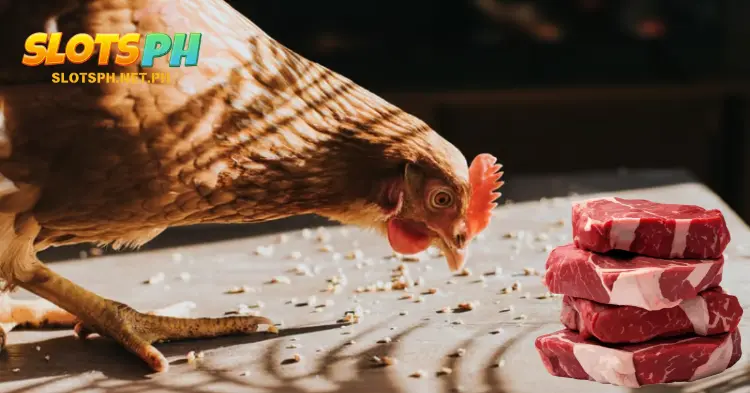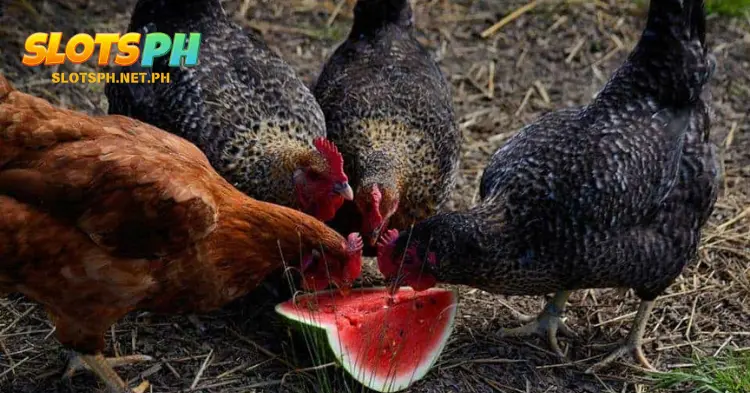Many people are still unsure whether it’s better to feed fighting roosters raw or cooked beef. SlotsPH is here to help you better understand this issue and determine the best approach to caring for your rooster. The goal is to ensure the rooster gets the right nutrients and develops in the best way possible.
Feed Fighting Roosters Raw or Cooked Beef? – Which Is Better?
In fact, both raw and cooked beef provide nutritional value for fighting roosters. It’s important to note that only humans know how to cook food properly, as our digestive systems have evolved over millions of years to adapt to this process. As a result, eating raw food can sometimes be difficult for humans to digest, possibly leading to digestive issues.

However, for roosters, there is not much difference between feed fighting roosters raw or cooked beef because they have a strong digestive system capable of absorbing and digesting these types of foods effectively. Just think—if they can eat spoiled, rotten food, raw beef is hardly a challenge for them. The key is not to worry too much about whether the beef is raw or cooked, but rather to ensure the right balance of quantity and quality. In addition, supplementing their diet with nutrients that boost digestion is important for maintaining a healthy rooster.
How to Feed Beef to Roosters?
After deciding whether to feed fighting roosters raw or cooked beef, the next step is to consider the best way to feed it to the rooster. This includes thinking about the timing, portion size, and any supplemental foods.
Feeding Time
The best time to feed a rooster is in the afternoon, when the weather is warm and sunny. At this time, there are still about 6-8 hours before nightfall, allowing the rooster enough time to absorb and digest the food. Avoid feeding beef in the morning, as it may be hard to digest, and similarly, avoid feeding it at night. During the evening, focus on softer, easily digestible foods to ensure the rooster can rest and digest properly. Additionally, for other types of fresh, high-protein foods that are harder to digest, it is best to feed them at a similar time.
Feeding 3-4 times a week is ideal to ensure the rooster receives enough nutrition to stay strong and healthy. Beef is excellent for building muscle mass, and when combined with other foods, it helps the rooster maintain peak health. Even bodybuilders eat a lot of beef to build muscle, and the same principle applies to our roosters.
Portion Sizes
Each time you feed your fighting rooster, 2-4 pieces of beef are sufficient. This amount is neither too much nor too little for their needs. Adjust the quantity based on the rooster’s stage of development. For example, during growth spurts or feather molting, provide more food to support rapid feather regrowth and recovery. However, if the rooster is undergoing weight management, reduce the portion size accordingly. Additionally, balance their beef intake with other protein sources to ensure a well-rounded diet.
For instance, if they are consuming other protein-rich foods such as snake, centipede, reptile meat, or fertilized duck eggs, you can decrease the beef quantity.
Feeding Method
Feeding large chunks of beef can make it difficult for roosters to digest due to the size and the prolonged digestion time required. Large pieces may not absorb enough digestive fluids in the rooster’s crop. It’s best to finely chop the beef and mix it with warm rice. Chopped meat is digested more quickly as it is fully exposed to digestive enzymes. This is similar to cooking a large piece of meat versus minced meat—the latter cooks much faster.
Supplement with Digestive Enzymes

To optimize digestion, consider occasionally supplementing your rooster’s diet with digestive enzymes. You don’t need to do this daily; 1-2 times per week is sufficient. In addition to commercial digestive enzymes, you can incorporate the following natural options:
- Garlic: Feeding roosters a small amount of crushed garlic (1-2 cloves per week) can enhance their immune system and prevent bloating or crop issues.
- Grit and Sand: Adding grit or small pebbles to their diet improves digestion in the crop by grinding down food particles. This natural method is a key part of a rooster’s digestive process.
Diversify Their Diet
While beef is an excellent source of nutrients, overreliance on it can be detrimental. Diversify the diet to support optimal development. Introduce fresh foods such as eel, loach, or reptiles. If feasible, include seafood like snails, fish, or crab to vary the nutrients and keep meals interesting for your rooster.
Conclusion
The debate over whether to feed fighting roosters raw or cooked beef is likely to continue. However, simplifying the care process can make a big difference. If feeding raw beef works well for your rooster, stick with it. Conversely, if cooking the beef seems better and you have the time, go for it.
For breeders managing hundreds or thousands of roosters, optimizing care to save time and effort is crucial. The key is to maintain flexibility and adapt feeding methods based on your resources and the rooster’s needs. Are you looking for a reputable and top-quality casino for betting? Try our partners Tapwin 2024.


